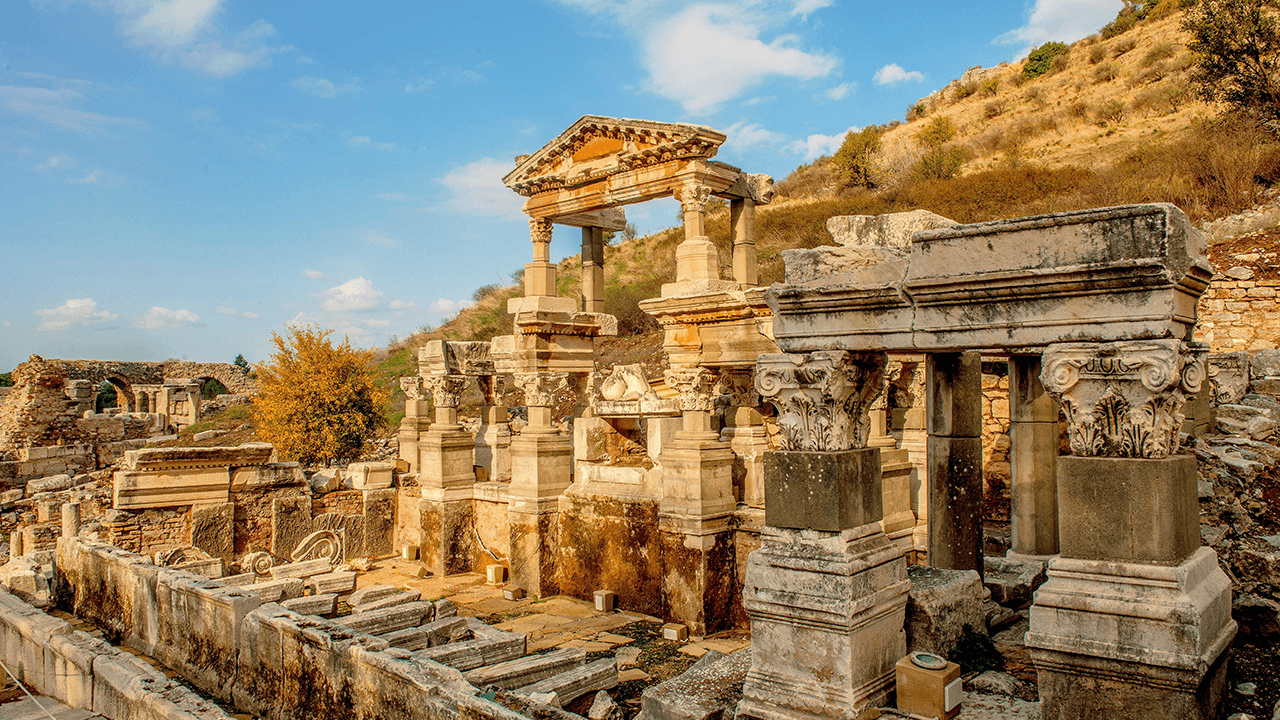Ephesus General Information about an Ancient City
Ephesus, known in antiquity as one of the greatest and most prosperous cities of Asia Minor, is located in present-day Turkey. Strategically situated at the foot of Mount Pion and near the mouth of the River Cayster, this city was a major commercial, religious, and cultural hub. Its historical significance spans millennia, standing as a symbol of the grandeur of ancient civilizations.
However, its decline began with the gradual silting of its harbor, known as Panormus, which led to the loss of its commercial prominence. Today, the ruins of Ephesus remain an open-air museum, attracting thousands of visitors eager to explore its rich heritage.
History and Evolution of Ephesus
Ephesus underwent several relocations over the centuries. Its last known location lies east of the Ayasoluk Hill, near the modern town of Selçuk. It was one of the twelve Ionian cities of the Aegean and played a crucial role in the culture and politics of its time. Possibly founded during the Mycenaean period, the city experienced multiple transformations under Greek, Persian, Roman, and Byzantine rule.
Ephesus was a significant religious center, home to notable figures of early Christianity such as the Apostle Paul, John the Evangelist, and the Virgin Mary. Additionally, it hosted several ecumenical councils, solidifying its importance in Christian history. In the Book of Revelation, Ephesus is one of the seven churches of Asia, further enhancing its religious significance.
The Temple of Artemis: One of the Seven Wonders of the Ancient World
One of Ephesus’ most recognized symbols was the Temple of Artemis, one of the Seven Wonders of the Ancient World. Built in honor of the goddess Artemis, the temple was renowned for its architectural magnificence. Featuring marble columns and intricate decorations, it represented the religious devotion and artistic talent of its inhabitants. Though it was destroyed by looting and natural disasters, its legacy endures as a jewel of the ancient world.
The Decline of Ephesus
As Ephesus’ harbor began to silt up, the city lost its direct access to the sea, weakening its position as a commercial hub. Residents started moving to nearby areas like Selçuk, leaving behind a city that had once been a center of power and culture.
Under Byzantine and Ottoman rule, Ephesus was gradually forgotten and reduced to ruins. Today, it is a renowned archaeological site, where excavations and scientific studies continue to uncover its past.
What to See in Ephesus Today
The ruins of Ephesus offer a glimpse into the past, allowing visitors to explore its rich history through its well-preserved monuments and streets. Highlights include:
- Library of Celsus: Built in the 2nd century AD, it is one of the most impressive and well-preserved buildings in Ephesus.
- Ephesus Theater: With a capacity of 25,000 people, this theater was used for plays, concerts, and political gatherings.
- Curetes Street: One of the city’s main thoroughfares, lined with columns and decorations.
- Trajan’s Fountain: A monument dedicated to Emperor Trajan, featuring unique architectural details.
- Terrace Houses: Residences of Ephesus’ elite, adorned with frescoes and mosaics.
- Temple of Hadrian: A beautiful example of Roman architecture dedicated to Emperor Hadrian.
- Commercial Agora: An ancient marketplace showcasing Ephesus’ commercial importance.
The Religious Significance of Ephesus
Ephesus was not only significant for commerce and culture but also for religion. In addition to being mentioned in the Book of Revelation, the city is known as the home of John the Apostle, who, according to tradition, cared for the Virgin Mary in her final years. The House of the Virgin Mary, located near Ephesus, is a pilgrimage site visited by millions annually.
The Council of Ephesus, held in 431 AD, also took place here. This event was pivotal in defining the nature of Christ and affirming Mary as Theotokos (Mother of God).
Ephesus Today: An Archaeological Treasure
Today, Ephesus is a premier tourist destination, attracting thousands of visitors from around the globe. Its cobblestone streets, well-preserved monuments, and historical atmosphere make Ephesus an unforgettable place. Every corner of the city tells a story, from its peak as a center of power to its transformation into one of the world’s most important archaeological sites.
Exploring Ephesus is like traveling back in time, offering a unique experience that combines history, art, religion, and culture in one extraordinary location. It remains a living reminder of the splendor of the ancient world and a treasure that continues to shine through the ages.



3 thoughts on “Ephesus General Information”
★★★★★
Highly recommend visiting ‘Ephesus General Information’—a site rich with history and unparalleled beauty.
★★★★★
The charm of ‘Ephesus General Information’ captivated me entirely. It’s a destination that leaves no one indifferent.
★★★★★
I was blown away by everything ‘Ephesus General Information’ has to offer. Definitely a place to return to in the future.